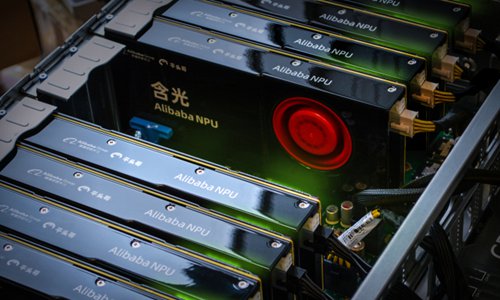HOME >> BUSINESS
Alibaba’s semiconductor division unveils first AI chipset
By Zhang Hongpei Source:Global Times Published: 2019/9/25 19:33:40

A view of Alibaba's AI chip Hanguang 800 Photo: Courtesy of Alibaba
Chinese e-commerce giant Alibaba unveiled its first artificial intelligence (AI) inference chipset, the most powerful so far, on Wednesday, a move that analysts believe shows the company is pursuing cutting-edge technologies amid the nation's drive for technology independence.
Called Hanguang 800, the chipset is the first that Alibaba has launched since its semiconductor division Pingtouge was established a year ago.
Having the highest performance, which is four times quicker than the current top AI chipset in the industry, Hanguang 800 specializes in machine-learning tasks and providing better services for Alibaba's cloud computing division, according to a statement that Alibaba sent to the Global Times on Wednesday.
"In the global chip sector, Alibaba is a newcomer. The Xuantie and Hanguang 800 are just the first steps in the company's long march," said Alibaba Chief Technology Officer Jeff Zhang during the launch event.
In July, Alibaba released its first core processor IP Xuantie 910, which can be used in 5G networks, AI and autonomous driving.
Having been applied in Alibaba's core businesses including its Taobao platform, the Hanguang 800 chipset can recognize 1 billion product images in five minutes compared with the previous time of one hour by using traditional graphics processing units, said the statement.
"Alibaba has the confidence and ability to do what traditional hardware companies can do and cannot do: we can produce hardware like they do, and we can turn our software into hardware, which they cannot do," said Zhang, adding the breakthrough of Hanguang 800 lies in the innovation of finding synergies between hardware and software.
"Engineering collaboration between software and hardware is becoming increasingly critical to unleash the full potential of AI," said Charlie Dai, principal analyst at market research company Forrester Research Inc.
"Alibaba's investment in hardware is not as early as some other players, but the game just started and it is not too late. Its investment in AI chips is strategic, and it has a broad digital ecosystem to leverage," Dai told the Global Times on Wednesday.
Alibaba has taken the lead in Asia's cloud computing sector. It is the largest public cloud services provider in the Chinese market, taking a 28.5 percent share in the first half of 2019, according to market research firm Frost & Sullivan.
Investment in AI chips is a must for digital leaders like Alibaba in the dynamic macroeconomic environment. The platform business around the digital ecosystem of chips has already become the new battlefield for technology players, Dai noted.
Chinese telecommunications giant Huawei has also been beefing up efforts in architectural innovation, investment in all-scenario processors and the construction of an open ecosystem, which will require investment of another $1.5 billion.
Liu Dingding, a Beijing-based industry analyst, told the Global Times Wednesday that chipsets and operating systems (OS) are crucial aspects for a technology company in the long run.
"With today's move, Alibaba is shedding its label of being only a software company. I guess it will also release its own OS someday," said Liu.
The two technology giants' recent announcements reflect the trend that China is endeavoring to develop its domestic technologies amid the trade tensions.
"China is taking the lead in some of the AI application areas and limited algorithm engineering spaces, while lagging behind global leaders in general, especially from the AI hardware infrastructure perspective," said Dai.
However, it is expected that Chinese vendors will narrow the gap in dedicated AI chips optimized for specific workloads, which offers huge potential for future business growth, he added.